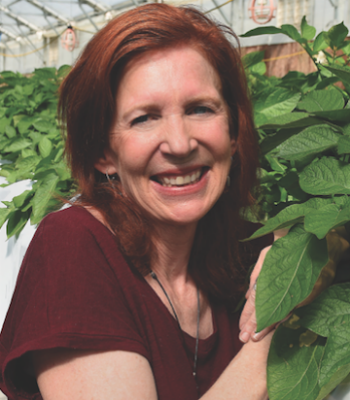
Spudwomen 2016: Liz Sanders
“I’m incredibly bossy, so I think that makes me especially suited for management, Liz Sanders said, laughing at her self-assessment. “My job is to make sure that everything here runs beautifully.”
“Here” is the CSS Farms Colorado City, Colorado, greenhouse complex. Sanders has been managing the nuclear seed and tissue culture facility for the past five years.
Originally from Penfield, New York, she started as the operations manager in Colorado City, and three years ago was promoted to general manager.
CSS opened the Colorado City greenhouse facility in 2004. In 2013, it expanded the size of the facility to 30,000 square feet. It’s located just off Interstate 25, about an hour south of Colorado Springs.
According to Sanders, the advantages of the Colorado City location include an average of over 300 days of sunshine, an elevation of 5,800 feet above sea level that allows for cool nights, and the lack of any nearby potato or vegetable fields, which reduces pest and disease pressures.
She estimates that they are currently growing more than 100 varieties in the production area of the hydroponic greenhouses. Plants are fed nutrient-rich water through their root system in the hydroponic environment.
Sanders said that they customize the nutrients in the water to meet the nutritional needs of specific varieties based on their physiological age. This allows CSS to enjoy higher production numbers from their plants than conventional soil-based plants.
“We have a much quicker growth rate because the plants get exactly what they need,” Sanders said. “Our average is 40 tubers per plant, but we actually had one variety that we got 88 tubers per plant.”

A group of workers harvest mini-tubers in one of the CSS greenhouses in Colorado City.
She said that they produce about 6 million mini- tubers each year in the complex.
“I would say we grow about two and a half cycles per year. Each cycle is about four months, so that’s four weeks in a vegetative state and then 12 weeks of harvest, twice a week.”
Following harvest, the mini-tubers are put through a greening process that makes them less susceptible to bacteria and viruses.
At the end of the harvest cycle they will disinfect the greenhouse before starting the process all over again.
“We have an amazing disinfection system where we gut everything, clean everything and start all over again,” Sanders said.
CSS has 12 farming operations in seven states, with the Colorado City nuclear operation representing the starting point for all the operations. The mini-tubers go to CSS seed farms and then to commercial CSS fields.
“We are the beginning of all of that. I always tell my guys that we are ultra-important because without us, none of the rest happens,” Sanders said.














